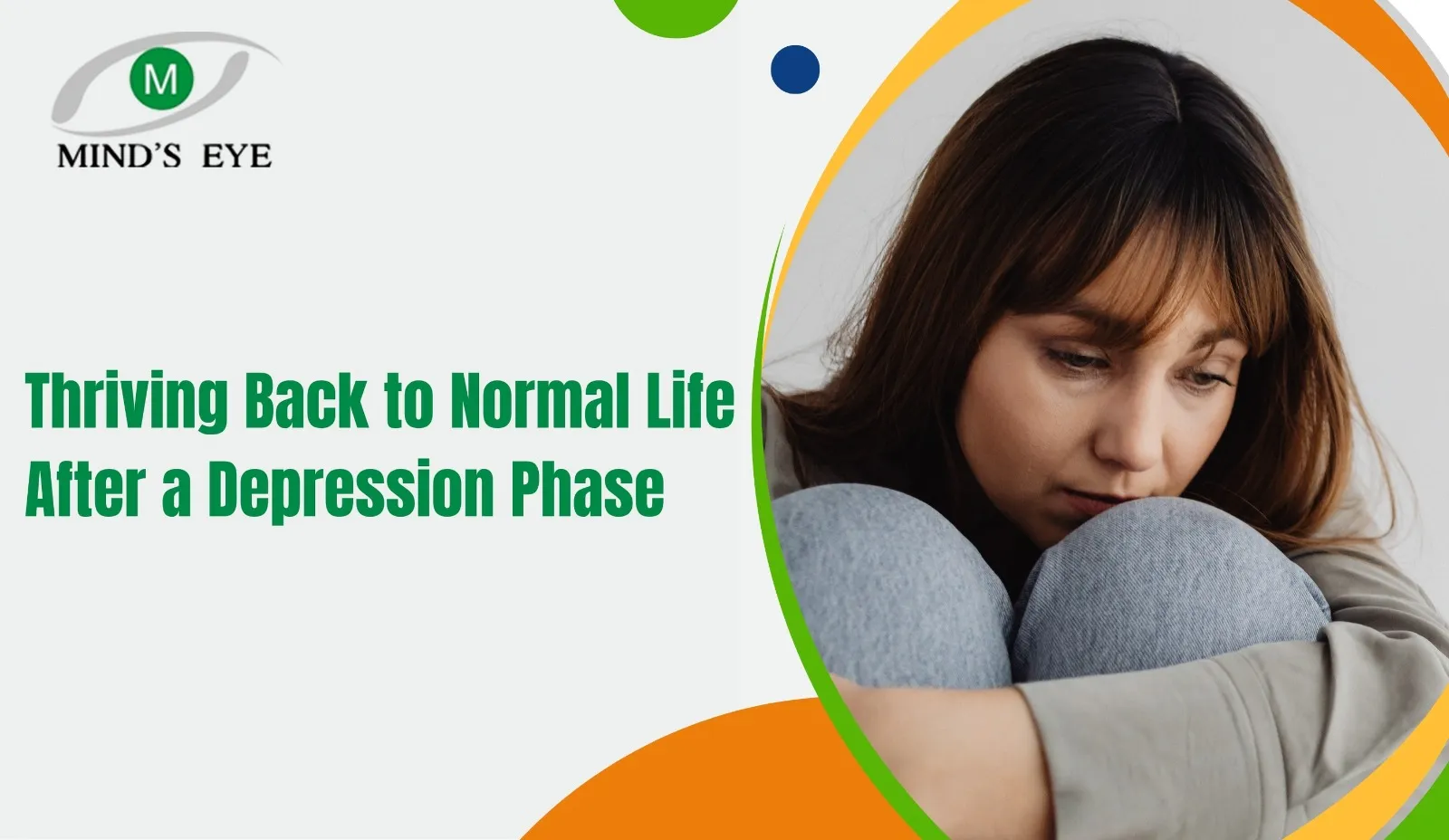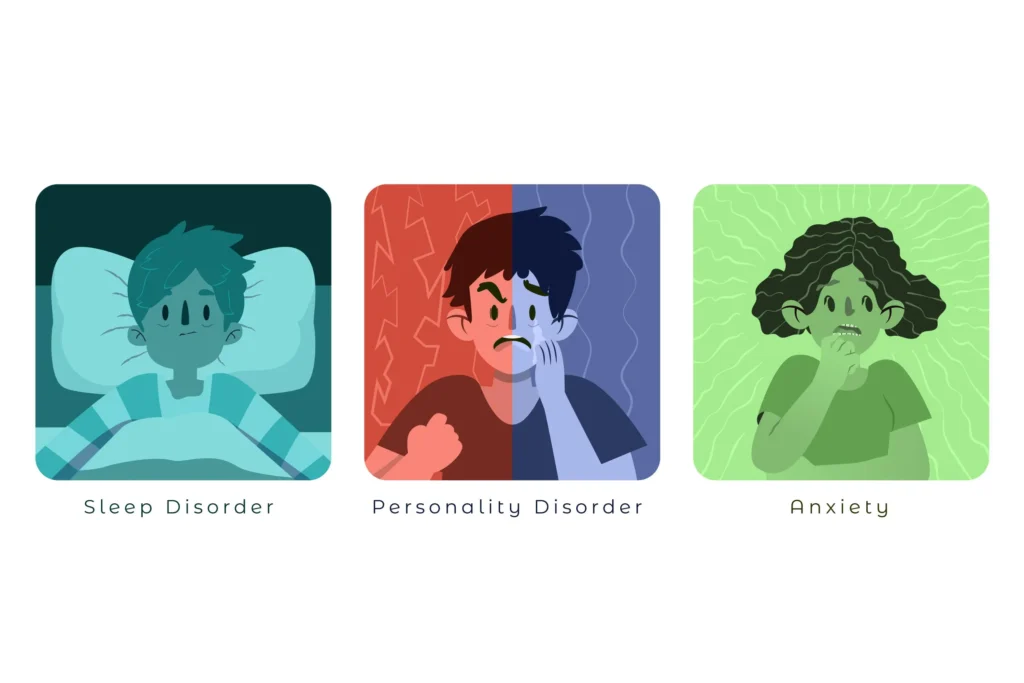-
129, Block-A Bangur Avenue, Mousumi Appartment, Kolkata 700055
129, Block-A Bangur Avenue, Mousumi Appartment, Kolkata 700055

Hello Reader!
Welcome to the blog page of Mind’s Eye by Dr. Rupa Talukdar, one of the best psychological counsellor in Kolkata.
Going through a depression phase can feel like walking through a long, dark tunnel with no visible end. Everything slows down—motivation, joy, energy, and hope. But the good news is, healing is possible. With the right support, understanding, and inner strength, individuals can not only recover but also thrive back to normal life after a depression phase.
As the best psychological counsellor in Kolkata, I’ve seen firsthand how people can regain control, rebuild resilience, and rediscover joy. Recovery is not a destination—it’s a process. Here’s how you can take meaningful steps toward reclaiming your life.

A depression phase is not simply feeling sad. It affects your thoughts, emotions, behavior, and even physical health. You may experience:
Recognizing these signs is the first step toward seeking help. As the best psychological counsellor in Kolkata, I always emphasize that acknowledging mental health struggles is a strength, not a weakness.
One of the biggest challenges after a depression phase is regaining momentum. Don’t pressure yourself to jump into a full schedule immediately. Begin with small, manageable tasks—getting out of bed at the same time daily, eating a healthy meal, or going for a 10-minute walk. Small wins accumulate into big changes.
Structure provides stability. During the depression phase, routines often fall apart, leaving individuals feeling more lost. Gradually reintroduce structure to your day—set sleep schedules, include meal times, work hours, and relaxation breaks. This helps retrain your brain to embrace normalcy.
Many people try to battle depression alone, but professional support can significantly accelerate recovery. As the best psychological counsellor in Kolkata, I tailor therapy approaches like Cognitive Behavioral Therapy (CBT), mindfulness practices, and talk therapy to each individual’s unique needs, helping them cope with their emotions and reshape negative thought patterns.
During a depression phase, isolation becomes common. Rebuilding connections—whether with family, friends, or support groups—can help bring back a sense of belonging. Even small interactions, like having tea with a friend or calling a relative, can uplift your mood.
What once brought you joy might seem dull after a depression phase, but revisiting those interests—even if they feel forced at first—can spark emotional healing. Whether it’s painting, writing, gardening, or dancing, creative expression plays a crucial role in mental rejuvenation.
Don’t judge yourself for how long recovery takes. Every step forward—no matter how small—is progress. Speak to yourself with kindness and patience. As the best psychological counsellor in Kolkata, I always remind my clients that healing isn’t linear—it’s about moving forward, even with small steps.
Learning to stay present helps reduce anxiety about the future or guilt about the past. Breathing exercises, meditation, or simply pausing to observe your thoughts without judgment can foster emotional balance. These practices are often a key component of the recovery journey I guide people through as a psychological counsellor in Kolkata.

Emerging from a depression phase is a gradual process, and recognizing when you are truly ready to thrive again is crucial for sustainable recovery. Here are the key signs that suggest you are prepared to embrace normal life and move forward with confidence:
You find yourself regaining interest in hobbies, work, or social activities that you previously enjoyed. This renewed curiosity and willingness to engage is a strong indicator that you are moving past the depression phase.
You notice a steady increase in your energy levels and motivation. Tasks that once felt overwhelming now seem manageable, and you can set and achieve small goals consistently.
Mood swings and persistent sadness become less frequent. You experience a greater sense of emotional balance and can manage stress and setbacks without feeling overwhelmed.
Your sleep and appetite return to a consistent, healthy routine. Disruptions in these areas often accompany depression phases, so their normalization is a positive sign of recovery.
You start to view yourself and your future more optimistically. Self-critical thoughts decrease, and you begin to appreciate your strengths and progress, which is essential for thriving after a depression phase.
You feel comfortable reaching out to friends, family, or colleagues. Rebuilding and nurturing relationships is a significant milestone in returning to normal life.
You utilize healthy coping mechanisms—such as mindfulness, exercise, or creative outlets—to manage stress and emotions, rather than reverting to avoidance or negative habits.
You are willing to try new things, take on challenges, or make plans for the future. This openness reflects a shift from survival mode to a growth-oriented mindset.
You maintain follow-up sessions with your counsellor, not out of necessity, but as a proactive step for ongoing well-being. This indicates a commitment to sustaining your mental health gains.
You feel hopeful about what lies ahead and have a renewed sense of purpose. Setting goals and looking forward to the future are clear signs you are ready to thrive after a depression phase.

Sustaining recovery after a depression phase requires a holistic, proactive approach that addresses both emotional well-being and lifestyle factors. Leading experts and research highlight several key strategies for maintaining long-term mental health and preventing relapse:
Structured psychotherapies—especially Cognitive Behavioral Therapy (CBT) and Interpersonal Therapy (IPT)—are proven to reduce the risk of relapse and recurrence when continued over time. CBT, in particular, has enduring benefits even after therapy is discontinued, helping individuals manage negative thought patterns and build resilience. Maintenance therapy, which may combine medication and psychotherapy, is recommended for those with recurrent depression.
Well-being therapy, based on enhancing autonomy, personal growth, purpose, and positive relationships, has shown promise in preventing relapse and promoting optimal psychological health. This approach encourages self-observation, structured goal-setting, and problem-solving to move from mere symptom control to thriving.
Experts emphasize the importance of regular exercise, balanced nutrition, and good sleep hygiene in sustaining recovery. Physical activity boosts mood and energy, while consistent routines support emotional stability. Avoiding alcohol and other substances that can worsen mood is also crucial.
Maintaining connections with supportive family, friends, peers, and mental health professionals provides accountability, encouragement, and a sense of belonging. Participating in support groups or therapy communities can reinforce recovery and reduce feelings of isolation.
Mindfulness, meditation, and stress management techniques help manage triggers and emotional ups and downs. Engaging in hobbies, creative pursuits, or volunteer work can provide purpose and fulfillment, reducing the risk of slipping back into a depression phase.
A consistent daily schedule—including time for self-care, work, social activities, and rest—provides stability and purpose. Setting realistic, achievable goals (both short- and long-term) fosters motivation and a sense of accomplishment.
Staying vigilant for early warning signs of relapse and seeking prompt support can prevent a full recurrence. Regular check-ins with your therapist or the best psychological counsellor in Kolkata ensure ongoing guidance and adjustment of strategies as needed.
Practicing self-kindness, especially during setbacks, helps sustain motivation and confidence. Educating yourself about depression and recovery empowers you to make informed choices and advocate for your well-being.
Also Read: What is Binge Eating Disorder in Kids?

Recovering from a depression phase or any significant emotional challenge is a deeply personal journey, but the guidance of the best psychological counsellor in Kolkata can be transformative. Here’s how expert support makes a crucial difference in helping you reclaim your well-being and thrive:
A trusted counsellor provides a confidential, non-judgmental space where you can express your emotions openly. This safe environment encourages honest self-exploration, which is essential for healing and personal growth.
The best psychological counsellor in Kolkata is skilled at recognizing early signs of mental distress—such as persistent sadness, mood swings, or social withdrawal—and can intervene before issues escalate. Through comprehensive assessments, they develop personalized treatment plans using evidence-based therapies like Cognitive Behavioral Therapy (CBT), mindfulness, and lifestyle counseling to address your unique needs.
Counselling helps you gain deeper self-awareness, identify emotional triggers, and understand underlying patterns that contribute to distress. This insight is the foundation for building resilience and developing healthier responses to life’s challenges.
With professional guidance, you learn practical coping mechanisms for managing stress, anxiety, and depressive symptoms. Techniques such as mindfulness, relaxation exercises, and structured problem-solving empower you to handle setbacks and prevent relapse.
A counsellor assists you in setting realistic, meaningful goals and creating actionable plans to achieve them. This structured approach helps restore motivation and a sense of purpose, both of which are vital for returning to normalcy after a depression phase.
The best psychological counsellor in Kolkata can help you rebuild and strengthen relationships by improving communication, empathy, and conflict resolution skills. Reconnecting with others is a key step in regaining a sense of belonging and support.
Regular sessions with your counsellor ensure continuous monitoring of your progress. You’ll receive guidance on recognizing early warning signs, adjusting strategies as needed, and maintaining long-term mental health.
Through affirmations, positive reinforcement, and challenging negative beliefs, counselling helps rebuild your self-esteem and confidence, essential for thriving in daily life.

1. How long does it take to feel normal after a depression phase?
Recovery timelines vary for everyone. With proper therapy and self-care, many people start seeing improvement within a few weeks to months.
2. Is it normal to still feel low sometimes after coming out of depression?
Yes, occasional low days are normal. The key is learning how to manage those emotions and not let them control your life again.
3. What are the first steps to take after a depression phase?
Start small—build a daily routine, focus on self-care, and seek support from a trusted mental health professional or counsellor.
4. Can therapy help in thriving after depression?
Absolutely. Therapy provides tools to rebuild confidence, cope with stress, and prevent relapse. It’s a key step in long-term recovery.
5. How do I stay motivated to move forward after depression?
Set realistic goals, celebrate small wins, stay connected with loved ones, and consult the best psychological counsellor in Kolkata for consistent guidance.
Recovering from a depression phase is not just about survival—it’s about growth, resilience, and rediscovery. With support from a compassionate mental health professional and a commitment to self-care, it’s entirely possible to build a life filled with meaning and joy again.
If you or someone you love is struggling after a depression phase, don’t hesitate to seek help. As the best psychological counsellor in Kolkata, I, Dr. Rupa Talukdar, am here to walk alongside you on this journey toward healing and thriving.